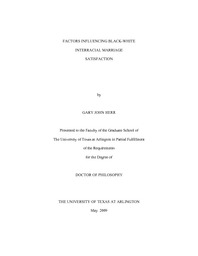
ATTENTION: The works hosted here are being migrated to a new repository that will consolidate resources, improve discoverability, and better show UTA's research impact on the global community. We will update authors as the migration progresses. Please see MavMatrix for more information.
Show simple item record
| dc.contributor.author | Herr, Gary John | en_US |
| dc.date.accessioned | 2009-09-16T18:20:42Z | |
| dc.date.available | 2009-09-16T18:20:42Z | |
| dc.date.issued | 2009-09-16T18:20:42Z | |
| dc.date.submitted | January 2008 | en_US |
| dc.identifier.other | DISS-10162 | en_US |
| dc.identifier.uri | http://hdl.handle.net/10106/1892 | |
| dc.description.abstract | The purpose of this study is to investigate the marital satisfaction of Black-White interracial couples. This research study was undertaken by looking at the differences among interracially married Black-White couples and intra-married Black and White couples, using data from an American sample of 808 couples (White male-Black female, Black female-White male, Black male-Black female, White male-white female). These couples had presented for counseling or marriage enrichment and had taken the Evaluating and Nurturing Relationship Issues, Communication, Happiness Inventory (ENRICH) between January 2007 and mid-summer 2008. The ENRICH Inventory measures individual and dyadic responses to questions regarding marital satisfaction across multiple domains. A mixed-model factorial ANOVA design was used on ten subscales of the ENRICH Inventory to examine whether there were mean differences based on two between factors of wife's race and husband's race and any interaction effects. In addition, an analysis of the PCA scores (couple agreement scores) by a MANOVA was conducted. Even though the ANOVA indicated there were significant differences for both main effects for certain variables (e.g. Children and Parenting, Conflict Resolution, ivand Role Relationship) and interaction effects (e.g. Communication, Leisure Activities, Personality Issues, and Spiritual Beliefs), effect sizes were small. Significance was probably due to the large sample size of this study. The MANOVA indicated no significant differences by race and gender for the ten sub-scales of the Couple Agreement Scores (PCA). Past studies have been suggestive of severe adjustment and stressful interactions for Black-White interracial couples. However, this was not found in this study. There may be areas where past ethnic and cultural factors may contribute to differences rather than any specific racial or ethnic discord. This study found interracial Black-White couples to be more similar than dissimilar to intra-racial Black and intra-racial White couples in perceived marital satisfaction. | en_US |
| dc.description.sponsorship | Jordan, Catheleen | en_US |
| dc.language.iso | EN | en_US |
| dc.publisher | Social Work | en_US |
| dc.title | Factors Influencing Black/white Interracial Marriage Satisfaction | en_US |
| dc.type | Ph.D. | en_US |
| dc.contributor.committeeChair | Jordan, Catheleen | en_US |
| dc.degree.department | Social Work | en_US |
| dc.degree.discipline | Social Work | en_US |
| dc.degree.grantor | University of Texas at Arlington | en_US |
| dc.degree.level | doctoral | en_US |
| dc.degree.name | Ph.D. | en_US |
| dc.identifier.externalLink | http://www.uta.edu/ra/real/editprofile.php?onlyview=1&pid=387 | |
| dc.identifier.externalLinkDescription | Link to Research Profiles | |
Files in this item
- Name:
- Herr_uta_2502D_10162.pdf
- Size:
- 451.6Kb
- Format:
- PDF
This item appears in the following Collection(s)
Show simple item record


